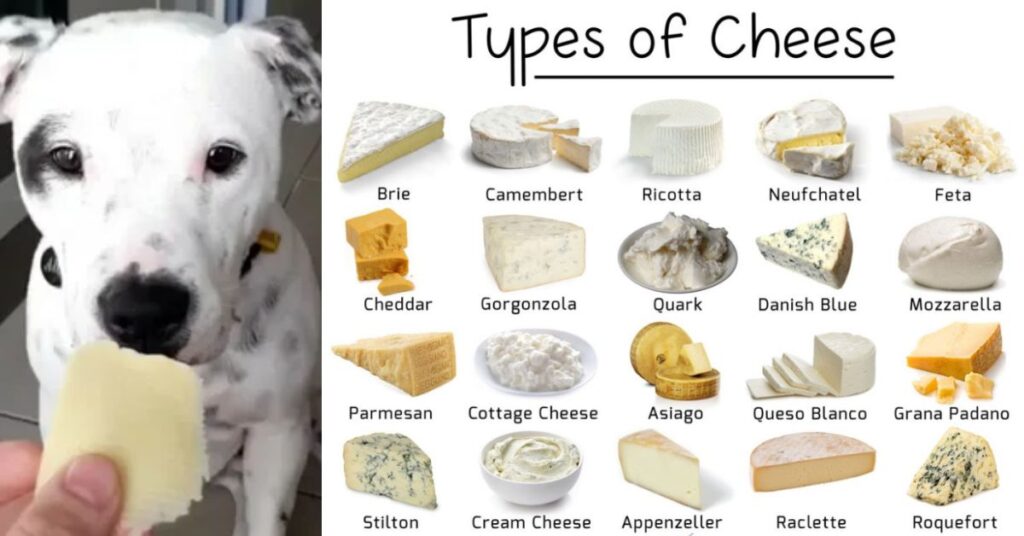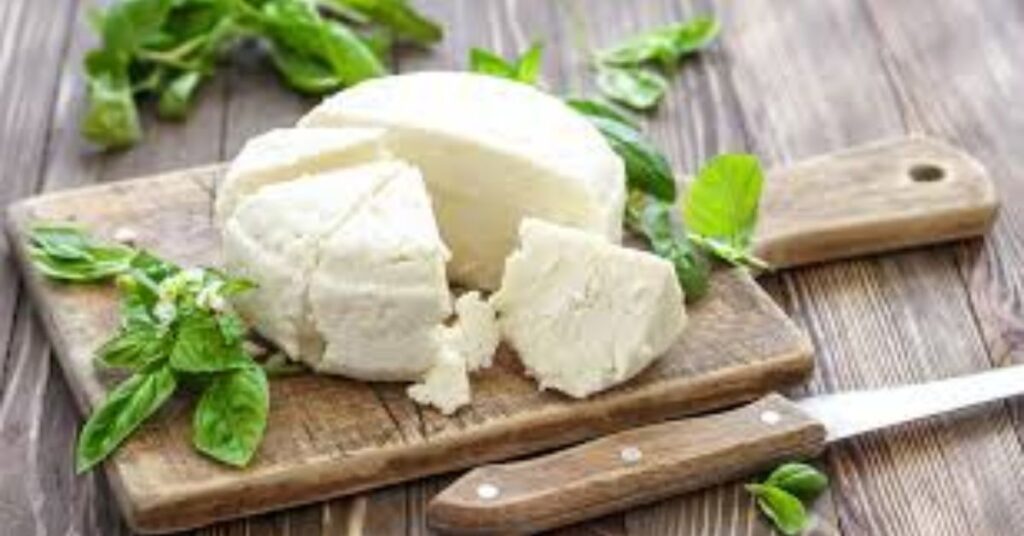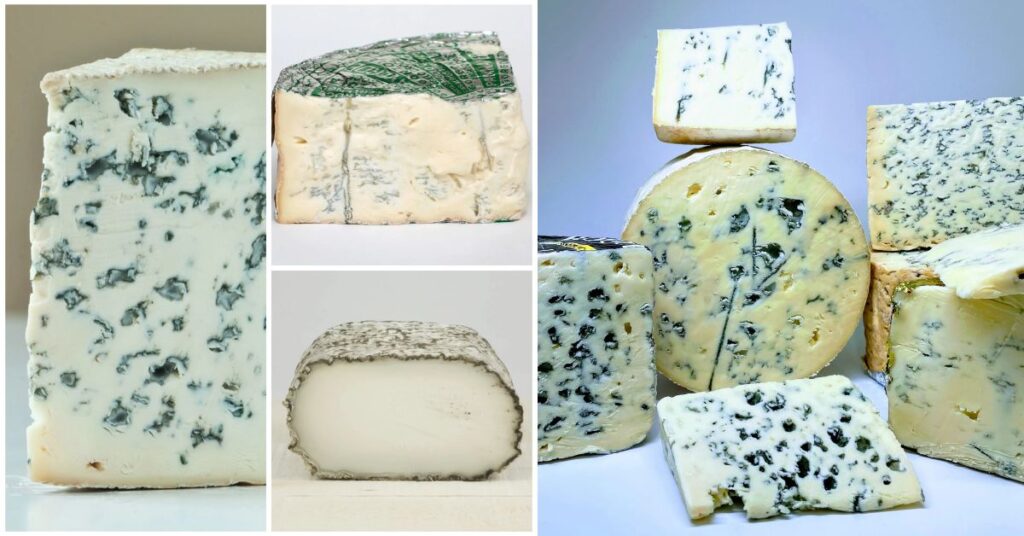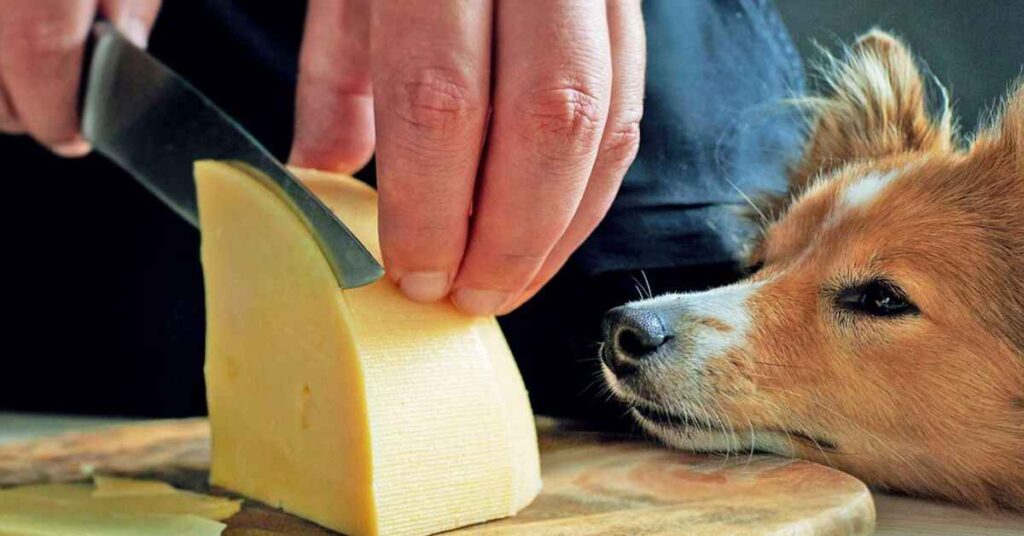As a dog owner, you may have wondered if it’s safe to share your love for cheese with your furry companion.
While cheese can be a tasty treat for dogs in moderation, it’s crucial to understand the types of cheese, potential benefits and risks, and responsible feeding guidelines.
In this comprehensive guide, we’ll explore the world of cheese and dogs, ensuring you have the knowledge to make informed decisions about incorporating cheese into your pup’s diet.
Types of Cheese and Their Suitability for Dogs

Not all cheeses are created equal when it comes to feeding our canine friends. Here’s a breakdown of various cheese types and their suitability for dogs:
Low-fat Cheeses
Low-fat cheeses like mozzarella and cottage cheese are generally safer options for occasional treats.
These varieties are lower in calories and fat, making them easier for dogs to digest. Examples include:
- Mozzarella
- Cottage cheese
- Ricotta
Hard Cheeses
Hard cheeses like cheddar and parmesan are higher in protein and calcium, which can be beneficial for dogs.
However, they also tend to be higher in fat and sodium, so moderation is key. Examples include:
- Cheddar
- Parmesan
- Swiss
Soft Cheeses

Soft cheeses like brie and cream cheese are generally not recommended for dogs due to their high fat content.
These cheeses may carry a higher risk of food-borne illnesses, which can be particularly dangerous for our furry friends. Examples include:
- Brie
- Camembert
- Cream cheese
Cheeses to Avoid

Certain cheeses should be strictly avoided when it comes to feeding dogs. These include:
Blue cheese:
The molds present in blue cheese can be toxic to dogs.
Processed cheese products:
These varieties are often high in salt, preservatives, and other additives that can be harmful to dogs.
Benefits and Risks of Feeding Cheese to Dogs

Like any treat, cheese comes with both potential benefits and risks when it comes to feeding it to our canine companions.
Benefits of Cheese for Dogs
Protein source:
Cheese is a good source of protein, which is essential for building and maintaining muscle mass in dogs.
Calcium for strong bones and teeth:
Many cheeses are rich in calcium, which supports healthy bone and tooth development in dogs.
Fatty acids for healthy skin and coat:
The fatty acids found in cheese can contribute to a healthy skin and shiny coat for your furry friend.
Probiotics:
Some cheeses, like cheddar and cottage cheese, contain probiotics that can aid in digestion and overall gut health.
Read This Blog: Can Cats Eat Ranch Dressing? Everything You Need to Know!
Risks of Feeding Cheese to Dogs
Lactose intolerance and digestive issues:
Some dogs may have difficulty digesting the lactose in cheese, leading to gastrointestinal upset, diarrhea, or vomiting.
Obesity and pancreatitis risk:
Cheese is high in fat and calories, which can contribute to obesity and increase the risk of pancreatitis in dogs if overfed.
Sodium content:
Many cheeses are high in sodium, which can lead to health issues like high blood pressure and kidney problems in dogs if consumed in excess.
Food-borne illnesses:
Soft cheeses and unpasteurized varieties may carry a higher risk of food-borne illnesses like Salmonella or Listeria, which can be particularly dangerous for dogs.
Guidelines for Responsible Cheese Feeding

If you decide to incorporate cheese into your dog’s diet, it’s essential to follow these guidelines to ensure their safety and well-being:
Moderation is key:
Treats like cheese should make up no more than 10% of your dog’s daily caloric intake. Overfeeding can lead to obesity and other health issues.
Choose low-fat, low-sodium varieties:
Opt for low-fat cheeses like mozzarella or cottage cheese, and avoid highly processed or salty varieties.
Introduce slowly:
When introducing a new food like cheese to your dog’s diet, do so gradually to monitor for any potential lactose intolerance or digestive issues.
Avoid moldy, spoiled, or highly processed cheeses:
These types of cheeses can be toxic or contain harmful additives and should be strictly avoided.
Consult your veterinarian:
If your dog has any underlying health conditions or if you have concerns about incorporating cheese into their diet, consult your veterinarian for personalized advice.
Dog-Friendly Cheese Recipes
If you’re looking to treat your pup with a cheesy delight, here are some dog-friendly cheese recipes to try:
Cheesy Frozen Pupsicles
Ingredients:
- 1 cup plain yogurt
- 1/2 cup low-fat mozzarella cheese, shredded
- 1/4 cup dog treats, crumbled
Instructions:
- Mix all ingredients in a bowl until well combined.
- Pour the mixture into dog-safe ice cube trays or popsicle molds.
- Freeze for at least 2 hours.
- Serve and enjoy!
Baked Cheesy Sweet Potato Bites

Ingredients:
- 1 large sweet potato, cooked and mashed
- 1/2 cup low-fat cheddar cheese, shredded
- 1 egg
- 1/4 cup whole wheat flour
Instructions:
- Preheat oven to 350°F (175°C).
- In a bowl, mix all ingredients until well combined.
- Scoop out tablespoon-sized portions and roll into balls.
- Place on a parchment-lined baking sheet.
- Bake for 15-20 minutes, or until golden brown.
- Let cool before serving.
Cheese and Veggie Muffins
Ingredients:
- 1 1/2 cups whole wheat flour
- 1 teaspoon baking powder
- 1/2 teaspoon baking soda
- 1/2 cup low-fat cottage cheese
- 1/2 cup grated carrot
- 1/2 cup grated zucchini
- 1 egg
- 1/4 cup water
Instructions:
- Preheat oven to 375°F (190°C).
- In a bowl, whisk together the flour, baking powder, and baking soda.
- Add the cottage cheese, grated carrot, grated zucchini, egg, and water. Mix until well combined.
- Scoop the batter into a greased muffin tin, filling each cup about 3/4 full.
- Bake for 18-20 minutes, or until a toothpick inserted into the center comes out clean.
- Let cool before serving.
Also Read This Blog: Can Cats Eat Spam? The Ultimate Guide
Ensuring Nutritional Balance for Dogs
While cheese can be a tasty and occasional treat for dogs, it’s important to remember that it alone does not provide complete and balanced nutrition.
A well-rounded diet is essential for your dog’s overall health and well-being.
Importance of a balanced, AAFCO-approved dog food diet:
High-quality, commercial dog foods that meet the nutritional standards set by the Association of American Feed Control Officials (AAFCO) should form the foundation of your dog’s diet.
These foods are formulated to provide the right balance of proteins, fats, carbohydrates, vitamins, and minerals.
Supplements for home-prepared diets:

If you choose to feed your dog a home-prepared diet, it’s crucial to consult with a veterinary nutritionist.
Your veterinarian to ensure your dog is receiving all the necessary nutrients. Supplements may be required to fill in any nutritional gaps.
Recommended nutrient ratios and ingredients:
The AAFCO recommends the following nutrient ratios for adult dogs:
Protein: 18% minimum Fat: 5.5% minimum Carbohydrates: No specific recommendation, but they should make up the remaining portion of the diet Calcium: 0.6% minimum
Phosphorus: 0.5% minimum
Ingredients like high-quality animal proteins, whole grains, fruits, and vegetables should be included in a well-balanced dog food.
By following these guidelines and offering cheese as an occasional treat, you can ensure your furry friend maintains a healthy, balanced diet while enjoying the occasional cheesy indulgence.
Conclusion
Cheese can be a tasty and enjoyable treat for dogs when fed in moderation and with the right precautions.
By understanding the types of cheese, their potential benefits and risks, and following responsible feeding guidelines, you can safely incorporate cheese into your dog’s diet.
Remember, moderation is key, and cheese should never replace a balanced, AAFCO-approved dog food diet.
Always consult with your veterinarian if you have any concerns or questions about introducing new foods to your furry friend.
So, go ahead and indulge your pup with a small bite of cheese now and then, but remember to do so responsibly.
Explore the delicious dog-friendly cheese recipes we’ve provided, and don’t forget to share your experiences and your pup’s favorite cheesy treats with us!
Frequently Asked Questions
Can dogs eat cheese every day?
No, cheese should not be fed to dogs daily. It should be treated as an occasional treat due to its high fat and calorie content. Overfeeding cheese can lead to obesity, pancreatitis, and other health issues.
Which cheese is best for dogs?
Low-fat cheeses like mozzarella, cottage cheese, and ricotta are generally safer options for dogs. Hard cheeses like cheddar and parmesan can also be fed in moderation.
Can puppies eat cheese?
It’s best to avoid feeding cheese to puppies until they are fully weaned and transitioned to a solid food diet. Their digestive systems are still developing and may have difficulty processing cheese.
Can dogs eat cheese if they are lactose intolerant?
If your dog is lactose intolerant, it’s best to avoid feeding them cheese or any dairy products, as they can cause digestive upset and discomfort.
How much cheese can I feed my dog?
Treats like cheese should make up no more than 10% of your dog’s daily caloric intake. The amount will vary based on your dog’s size, age, and activity level. Always consult with your veterinarian for personalized advice.
Real-Life Case Study:
“My golden retriever, Buddy, has always been a big fan of cheese. We started giving him small pieces of low-fat mozzarella as a training treat, and he would go crazy for it. However, we quickly realized that too much cheese would upset his stomach, so we had to be very careful with portions. Now, we reserve cheese as a special treat for when he’s been particularly well-behaved, and he knows the drill sit, stay, and he gets a little nibble of cheesy goodness. It’s become a fun bonding experience for us, and Buddy’s tail never stops wagging when he knows cheese is involved!”
Sarah, San Francisco, CA.
Remember, while cheese can be a delicious treat for our canine companions, it should always be given in moderation and with careful consideration of their individual dietary needs and preferences.
By following the guidelines outlined in this comprehensive guide, you can safely and responsibly incorporate cheese into your dog’s diet, creating a happy and healthy pup who enjoys the occasional cheesy indulgence.







